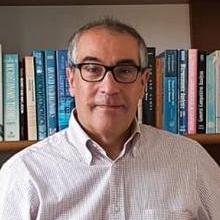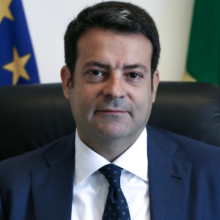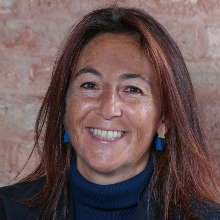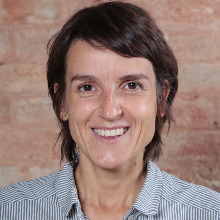Department of excellence
Why we are a Department of excellence
Our research activities are based on a solid tradition in economic studies - dating back to the origin of Ca’ Foscari University of Venice - founded as the first School of Economics and Commerce in Italy, and on Research in Economics, one of the best international journals for Economics and Finance, established in 1947 and now published by Elsevier. The Department of Economics was established in 2011 to consolidate the tradition of Ca’ Foscari in Economic studies, which have always been conducted in combination with quantitative methods and the study of law, of the institutions and of the territory.
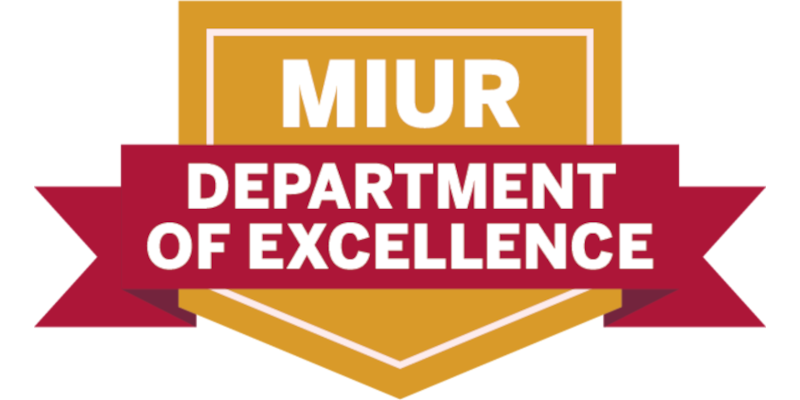
Today, the Department enrols more than 3500 students and employees, more than 115 tenured researchers and 25 members of the technical and administrative staff. It hosts more than 60 research fellows and more than 100 Junior researchers (PhD students and research scholars). Each year the Department welcomes about 20 visiting professors and visiting scholars, providing an international perspective for students and faculty members.
According to the 2023 QS World University Ranking by subject, the Department of Economics is one of the best Departments of Economics in Italy and at the international level it is indeed ranked in the Top 200 for Economics & Econometrics, in the Top 200 for Geography, in the Top 300 per Accounting & Finance, in the Top 350 for Law and in the Top 100 for Hospitality and Leisure Management.
The Department of Economics provides high quality research infrastructures, consistently with the most advanced international standards:
- the High Performance Computing calculation system
- the Laboratory of Experimental Economics
- the Bloomberg Finance Lab
- access to several databases.
These research infrastructures have been developed during the 2018-2022 Department of excellence project, within the framework of activities of the VERA Centre, and they will be enhanced and consolidated in the next years.
VIVA
Venice Initiative on Vulnerability Analysis
VIVA (Venice Initiative on Vulnerability Analysis) is an innovative research and educational programme that will be implemented thanks to the funding received by the Ministry of University and Research for the Departments of Excellence program. The aim of VIVA is to study how to deal with the issues related to social and economic systems in transition, with a special focus on vulnerable situations that might be exacerbated by exposure to exogenous shocks, increasing inequality in multiple contexts (economic, environmental, demographic, health, etc.).
The distinguishing feature of VIVA consists of a multidisciplinary scientific approach, which is based on field experiments and randomized controlled trials, to direct at evidence-based policies.

The specific aims of the project are the following:
- Reinforce a multidisciplinary approach and the Department's mission as a reference point for the study, design, implementation, and evaluation of public policies, when facing issues related to social and economic systems in transition
- Boost our research agenda by carrying out field experiments and randomized controlled trials, especially in the field of public policy
- Increase the Department's ability to attract international staff
- Start up and structure a constant interaction with the Department’s stakeholders and region, for a proactive sharing of requirements and responses.
The integration of research, teaching, and education will be reinforced by establishing a continuous collaborative process between the academia and public institutions, within different contexts.
Resources: 12,4 milion Euro
Recruiting 2023-2027
We will recruit:
2 Full professors
1 Associate professor
4 Tenure-track researchers
1 Technologist fixed term position
2 Employees of technical and administrative staff
Main project steps
2023-2025
- Recruitment of a cohesive research group and of technical and administrative members supporting the project implementation
- Plan and, design an integrated research program based on field experiments and randomized control trials
- Acquisition of hardware and software solutions to update our high performance computing calculation system
- Acquisition of software licences and databases useful for the development of the project
- Establishment of the VIVA research prizes, and award them based on the evaluation of the first two years of project
- Implementation of four PhD scholarships focused on specific VIVA research topics
- Plan a curriculum in Vulnerability in a Master's Degree of the Department
- Development of an advanced Internship programme on specific VIVA research topics
- Development and implementation of an advanced Summer School in field experiments for public policy
2026-2027
- Consolidation of the research groupUpgrade of hardware and software structure to consolidate the Department's calculation infrastructure
- Implementation of three PhD scholarships focused on specific research topics of VIVA
- Launch of the Master's Degree curriculum in vulnerability
- Implementation of the advanced Internship programme on specific VIVA research topics
- Development and implementation of two advanced Summer Schools "Social vulnerability in European perspective assessment tools and regulations" and "Data driven models of social exclusion and effects of targeted relief policies"
- Award of VIVA research prizes based on the evaluation of the last three years of the project
The aim of VIVA is to establish an integrated pathway to interdisciplinary research methods in the field of “vulnerability and transition”. The issues related to the vulnerability of social and economic systems in transition are highly relevant research topics. The concept of vulnerability should be defined considering the ongoing local, national and global transformations. In the past, the concept of social vulnerability used to design redistributive policies was based on dichotomous classifications – e.g. rich vs. poor, entrepreneurs vs. workers, producers vs consumers, more developed regions vs less developed regions. However, today’s global challenges and systemic crises (environmental, economic, demographic, health, etc.) should represent the unstable parameters to define and model social vulnerability and inequality.
VIVA will contribute to the study of tailored policies and regulation instruments able to provide responses to the emerging needs of social protection and to address the structural instability affecting individuals and social categories, such as exogenous shocks of extensive or global dimensions.
VIVA will set up an articulated competency framework:
- Specific sectoral knowledge in economics and law to investigate the socio-economic contexts most exposed to emerging vulnerability situations
- Scientific and methodological competencies, from advanced econometrics and statistical tools to the design and implementation of lab/field experiments and randomized controlled trials
- Theoretical and computational skills and tools to design social interaction models able to represent and predict the emergence of interdependencies and vulnerabilities as well as possible responses to public policy choices
- Legal competencies for the design of new forms of intervention
VIVA will be a place for developing innovative/experimental teaching activities for the training of economists on applied and quantitative research methods and for legal experts in public and private policies addressing vulnerability in several contexts within the European dimension.
The project includes the following planned activities:
- Creation of a Chair of Excellence programme to attract international researchers and scholars and offer a cycle of seminars and workshops
- Support of PhD Scholarships within the PhD programmes in Economics and in Law, Market and Person
- Organization of Advanced Summer Schools dedicated to specific VIVA research topics
- Implementation of an advanced internship programme for activities of research assistance that will be carried out at the Department of Economics or within institutions and research organisations working on the analysis and assessment of vulnerabilities
- Implementation of a new curriculum in vulnerability in the Master’s Degree in Economics, Finance and Sustainability.
VIVA will be based on 3 main investments in research infrastructures:
- Design and implementation of field experiments and randomized controlled trials
- Upgrade of the Department’s computing infrastructure (storage, cloud computing, data protection)
- Access to specific databases to strengthen vulnerability analysis and policy design
Project coordination will be guaranteed by the following governance structure:
- Management Group articulated on the different areas and competencies of the project
- Coordinator for the planning, design and management of lab&field experiments and randomized trials within VIVA project
- Department Advisory Board for an independent advice on scientific research lines as well as suggestions on the identified actions and new development plans of VIVA project
Michele Bernasconi - Project manager
Full Professor of Public Economics
Mario Padula - Rewarding Grants Development
Full Professor of Economics
Claudia Irti - Higher Educational Activities
Associate Professor of Private Law
Valeria Maggian - VERALabEx manager - VERA Laboratory for Experiments in Social Sciences
Associate Professor of Public Economics
Stefano Tonellato - Infrastructures' Development
Associate Professor of Statistics
Last update: 17/04/2024

